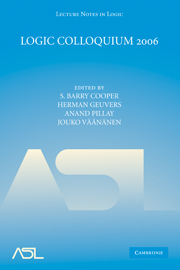Book contents
- Frontmatter
- Contents
- Introduction
- Definability and elementary equivalence in the Ershov difference hierarchy
- A unified approach to algebraic set theory
- Brief introduction to unprovability
- Higher-order abstract syntax in type theory
- An introduction to b-minimality
- The sixth lecture on algorithmic randomness
- The inevitability of logical strength: Strict reverse mathematics
- Applications of logic in algebra: Examples from clone theory
- On finite imaginaries
- Strong minimal covers and a question of Yates: The story so far
- Embeddings into the Turing degrees
- Randomness—beyond Lebesgue measure
- The derived model theorem
- Forcing axioms and cardinal arithmetic
- Hrushovski's amalgamation construction
The sixth lecture on algorithmic randomness
Published online by Cambridge University Press: 28 January 2010
- Frontmatter
- Contents
- Introduction
- Definability and elementary equivalence in the Ershov difference hierarchy
- A unified approach to algebraic set theory
- Brief introduction to unprovability
- Higher-order abstract syntax in type theory
- An introduction to b-minimality
- The sixth lecture on algorithmic randomness
- The inevitability of logical strength: Strict reverse mathematics
- Applications of logic in algebra: Examples from clone theory
- On finite imaginaries
- Strong minimal covers and a question of Yates: The story so far
- Embeddings into the Turing degrees
- Randomness—beyond Lebesgue measure
- The derived model theorem
- Forcing axioms and cardinal arithmetic
- Hrushovski's amalgamation construction
Summary
Abstract. This paper follows on from the author's Five Lectures on Algorithmic Randomness. It is concerned with material not found in that long paper, concentrating on Martin-Löf lowness and triviality. We present a hopefully user-friendly account of the decanter method, and discuss recent results of the author with Peter Cholak and Noam Greenberg concerning the class of strongly jump traceable reals introduced by Figueira, Nies and Stephan.
Introduction. This paper is a follow-up to the author's paper Five Lectures on Algorithmic Randomness, Downey [6], and covers material not covered in those lectures. In particular, I plan to look at lowness which was the basis of one of my lectures in Nijmegen, and to try to make accessible the decanter method whose roots come from the paper Downey, Hirschfeldt, Nies and Stephan [10], and whose full development was in Nies [23]. The class of K-trivial reals has turned out to be a remarkable “natural” class with really fascinating properties and connections with other areas of mathematics. For instance, K-trivial reals allow us to solve Post's problem “naturally” (well, reasonably naturally), without the use of a priority argument, or indeed without the use of requirements. Also, Kučera and Slaman [17] have used this class to solve a longstanding question in computable model theory, namely given a noncomputable Y in a Scott set S, there exists in S an element X Turing incomparable with Y.
As well I will report on recent work of the author with Peter Cholak and Noam Greenberg [4] on the computably enumerable strongly jump traceable reals which form a proper subclass of the K-trivials.
- Type
- Chapter
- Information
- Logic Colloquium 2006 , pp. 103 - 134Publisher: Cambridge University PressPrint publication year: 2009

